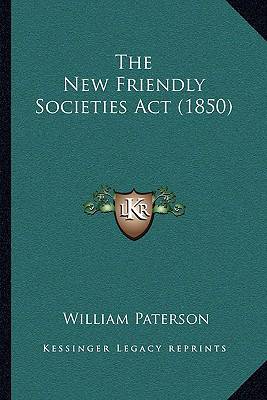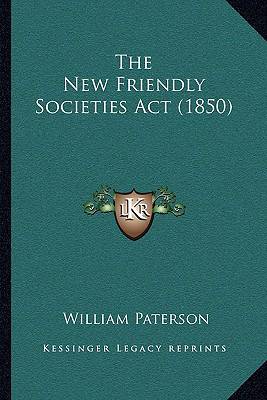
- Retrait gratuit dans votre magasin Club
- 7.000.000 titres dans notre catalogue
- Payer en toute sécurité
- Toujours un magasin près de chez vous
- Retrait gratuit dans votre magasin Club
- 7.000.0000 titres dans notre catalogue
- Payer en toute sécurité
- Toujours un magasin près de chez vous
Description
The New Friendly Societies Act (1850) is a book written by William Paterson that explores the history and impact of the Friendly Societies Act of 1850. The act was a significant piece of legislation that aimed to regulate and improve the operations of friendly societies, which were organizations that provided mutual aid and support to members during times of need. The book provides a detailed analysis of the act and its provisions, including the requirements for registration and governance of friendly societies. It also examines the social and economic context in which the act was introduced, and the various factors that led to its creation. Through a comprehensive review of historical documents and contemporary accounts, Paterson offers a nuanced and insightful perspective on the significance of the act and its legacy. He also discusses the challenges and limitations of the act, as well as the ongoing debates and reforms that have shaped the friendly society movement over the years. Overall, The New Friendly Societies Act (1850) is a valuable resource for anyone interested in the history of social welfare and mutual aid organizations, as well as the evolution of public policy in the 19th century.With Introduction, Notes, And A Copious Index.This scarce antiquarian book is a facsimile reprint of the old original and may contain some imperfections such as library marks and notations. Because we believe this work is culturally important, we have made it available as part of our commitment for protecting, preserving, and promoting the world's literature in affordable, high quality, modern editions, that are true to their original work.
Spécifications
Parties prenantes
- Auteur(s) :
- Editeur:
Contenu
- Nombre de pages :
- 70
- Langue:
- Anglais
Caractéristiques
- EAN:
- 9781167172243
- Date de parution :
- 10-09-10
- Format:
- Livre broché
- Format numérique:
- Trade paperback (VS)
- Dimensions :
- 152 mm x 229 mm
- Poids :
- 104 g

Les avis
Nous publions uniquement les avis qui respectent les conditions requises. Consultez nos conditions pour les avis.






